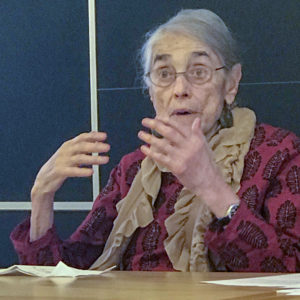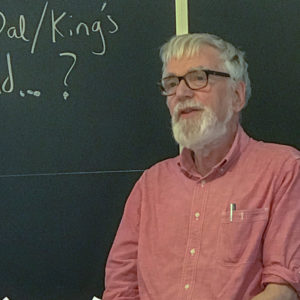The most serious obstacle to interdisciplinary work is the barrier between science and the humanities said Dr. Evelyn Fox Keller, one of King’s 2018 honorary doctorates at a roundtable discussion at King’s on May 30. It was part of grad week activities.

Dr. Evelyn Fox Keller
Dr. Fox Keller, Professor Emerita of History and Philosophy of Science at the Massachusetts Institute of Technology, and evolutionary biologist Dr. Ford Doolittle, also a King’s 2018 honorary doctorate, were here discussing the relationship between humanities and science with students, faculty and friends from Dalhousie University and King’s.
“An inveterate boundary crosser,” is how Dr. Evelyn Fox Keller described herself at the beginning of the discussion. She graduated in 1963 with a PhD in physics from Harvard, and later moved from scholarship in physics and biology to history. “I crossed a barrier from science to the humanities but never felt like I gave up my credentials as a scientist, yet I felt hostilities from both sides.”
She recalled speaking at a conference in Paris and being asked if she was speaking as a scientist or a historian. “I could not answer the question. I felt qualified in both.” She compared the separation as being like the Berlin Wall with armed defenses on either side.
“The issues are primarily territorial. Who gets to criticize?” she asked. “Scientists think only they get to criticize. Historians think they have the same right. There’s a lot of territoriality in departmental structures.”
Dr. Fox Keller, who’s also a respected feminist critic of science, offered examples of successes in discipline merging, including history and literature, and political science and psychology. And she says the history and philosophy of science, a discipline in the same family as King’s History of Science and Technology (HOST) honours program, offers hope of disciplines productively coming together.

Dr. Ford Doolittle
Dr. Ford Doolittle is Professor Emeritus at Dalhousie’s Department of Biochemistry and Molecular Biology. The Killam Prize (2017) and Herzberg Gold Medal winner (2013), with degrees from Harvard and Stanford, has long brought a humanistic lens to the study of science, calling it an intellectual necessity.
Dr. Doolittle expressed some dismay at the increasing difficulties in today’s society discerning truth and the bias of media. He said while he reads widely, he too is a product of his community and unable to separate what he believes from the community in which he belongs. He demonstrated his considerable humility saying that he studied biology because he didn’t consider himself smart enough for physics. Although he’s gained renown as an evolutionary biologist and disruptive thinker, he said he’s been rebranding himself recently as a philosopher of biology. He’s passionate as well about fine arts, graduating with a BFA in photography in 2013 from the Nova Scotia College of Art and Design when he was 72.
Both sciences and humanities are talking about the same problems without necessarily knowing that they are, such as climate change, he said.
We can’t have an ignorance-based society moving forward, Dr. Doolittle emphasized, adding that Dalhousie and King’s, and specifically HOST and all programs at King’s, have an enormous role to play in tackling contemporary issues holistically through interdisciplinarity.
He also said on a basic skill level the humanities offer sciences much.
“Writing is your most important skill as a scientist. It’s how you persuade people. It’s how you get grants. It’s what humanities teaches.”
There was full attendance for the roundtable, which was chaired by Dalhousie’s Dean of Science, Chris Moore.

